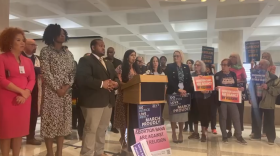It’s been one year since Roe v. Wade was overturned as a result of the U.S. Supreme Court decision in the Dobbs v. Jackson Women’s Health Organization case, returning the decision-making power over abortion laws to state legislatures.
Since the Dobbs decision, Florida’s abortion advocates and opponents have seen more interest in their causes, and also more abortions.
More Abortions
One year ago Michele Herzog, the director of the Pro-Life Action Ministry of Central Florida, was delivering a pro-life sermon in front of the All Womens Health Center in Altamonte Springs when she heard the court’s decision.
“We were elated because we felt validation that it was unconstitutional," she said. "But going forward what we have seen since Roe v. Wade being overturned, of course, went to the States, but here primarily in Florida, it has been devastating for the unborn.”
While the decision motivated pro-life activists and encouraged more people to join Herzog in demonstrating in front of clinics, the decision meant more people were traveling to Florida to receive an abortion after their home state banned the procedure, Herzog said.
"We have become what's called a 'Haven State' for women to come to, a Haven State for an abortion," she said. "We should be known for tourism, not for abortion, and that is what we have become."
Laura Goodhue, Executive Director of the Florida Alliance of Planned Parenthood, said she's also seen increased abortions at her clinics.

“Since that decision a year ago, especially in the northern sites in Jacksonville and Tallahassee in particular, we've seen a quadruple number of abortion care patients coming in the door,” she said.
The Impact
The Agency for Health Care Administration reported a 38% increase in Florida abortions from those out of state. This year's numbers, with the most recent update of May figures, show abortions appear to be on track to keep up with 2022's total of 6,726.
Since Dobbs, 12 states have near-total bans on abortion with very limited exceptions, according to the Guttmacher Institute. Two other states, North Dakota and Wisconsin, haven't banned abortion but access to procedures remains unavailable.
Wyoming is seeing a legal fight play out after a state judge temporarily blocked a state law banning the use of abortion pills, according to the New York Times. The law would have gone into effect on July 1.
Florida is one of four states that have laws that ban abortion after a specific point of gestation.
State legislators passed a six-week abortion ban this past session -- but it will only take effect if Florida's previous 15-week ban is upheld during a state supreme court challenge. The conservative-leaning court will review the measure this fall.
Restrictions on abortions not only bottle-necked a route to Florida for those seeking the procedure it also threatens to expose inequities in the healthcare system.
According to Guttmacher, the South and Midwest United States have the largest proportions of Black people while also maintaining the most states that have banned abortion or expected to do so. Guttmacher research suggests that these regions are more likely to also lack geographic access to maternity care and as a result have worse maternal and infant health outcomes.
Taking Action
Goodhue said the price of being denied abortion care is too costly. She's hopeful a ballot measure during the 2024 election will protect abortion.
“We have to collect a million signatures by the end of this year to make sure that we qualify. So it's a big effort. And it's going to take every single one of us signing petitions and volunteering and donating as well,” she said.
Goodhue said the Floridians Protecting Freedom initiative already has 200,000 signatures since May and will rally to get more on Saturday. Joining the cause are Orlando Democratic state Rep. Anna Eskamani and U.S. Democratic House member Maxwell Frost. The two will be canvassing with a group for signatures around downtown Orlando starting at 10 a.m.
Herzog said Pro-Life Action Ministries of Central Florida plans to demonstrate through ministry in front of abortion clinics Saturday. Herzog said the 15-week and 6-week bans are good starts, but she hopes that lawmakers will tighten restrictions further to "protect the rights of the unborn" in Florida.
"We're going to be praying a lot harder for other legislators that that they'll see that these are human beings that need protection," she said.





